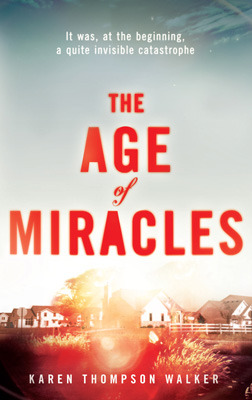Title: The Age of Miracles
Author: Karen Thompson Walker
Book #: Standalone
Publisher: Simon & Schuster
Publish Date: June 1st 2012
Pages: 369
Format: Hardcover
Date Read: August 18th 2013
Rating: ★★★★★ / out of 5
But among the artifacts that will never be found- among the objects that will disintegrate long before anyone from elsewhere arrives- is a certain patch of sidewalk on a California street where once, on a dark afternoon in summer at the waning end of the year of the slowing, two kids knelt down together on the cold ground. We dipped our fingers in the wet cement, and we wrote the truest, simplest things we knew- our names, the date and these words:We were here.
Summary:
What if our 24-hour day grew longer, first in minutes, then in hours, until day becomes night and night becomes day? What effect would this slowing have on the world? On the birds in the sky, the whales in the sea, the astronauts in space, and on an eleven-year-old girl, grappling with emotional changes in her own life..?
One morning, Julia and her parents wake up in their suburban home in California to discover, along with the rest of the world, that the rotation of the earth is noticeably slowing. The enormity of this is almost beyond comprehension. And yet, even if the world is, in fact, coming to an end, as some assert, day-to-day life must go on. Julia, facing the loneliness and despair of an awkward adolescence, witnesses the impact of this phenomenon on the world, on the community, on her family and on herself.
(synopsis taken from Goodreads)
Review:
While I did have a problem with this book, I cannot stand to give it anything less than 5 stars because I found the writing to be absolutely beautiful.
It didn't really hit me at first, and I almost stopped reading because the story wasn't going in exactly the direction I thought it would. However, as I kept on reading I just fell in love with the certain words that the author chose and how she crafted sentences and placed them at the ends of chapters so that you sat back and really pondered the deeper meanings.
I know not everyone will see it this way, and I do have to say that, if I didn't, I probably would have found the story a bit boring. And it was for me, in the beginning. I was so bored that I almost decided to put this book down. I didn't see myself connecting to Julia or her family from the start, and the story wasn't providing any solid science-fiction explanations as to why the slowing was happen.
While, by the end of the book, we still don't have answers as to why all this happened, I was able to connect to Julia. She is shy and feels alone a lot, and has a fleeting, first romance with the boy at the bus stop.
Overall, The Age of Miracles is definitely more contemporary than sci-fi, but I did enjoy the uncertainty and unusual-ness that the slowing created. It brought up a whole new world in which everyone was trying to adjust to and, at the end, left me wondering what we would do if this happened to us.
Quotes:
But, of course, there was nowhere on earth to go.
It was, at the beginning, a quite invisible catastrophe.
"Que será, será. That's what I always say. Whatever will be, will be."
The real catastrophes are always different- unimagined, unprepared for, unknown.
"The only thing you have to do in this life is die. Everything else is a choice."
I think we lost something when we lost that crisp rhythm, some general shared belief that we could count on certain things.
So much that seemed harmless in daylight turns imposing in the dark. What else, you had to wonder, was only a trick of light?
We were like wanderers in a desert, blessed with a rare downpour but unable to store the rain.
"Things change," she said. "But not everything has to."
Still the slowing went on and on. The days stretched. One by one, the minutes poured in- and even a trickle, as we have come to understand, can eventually add up to a flood.
"The thing about an explosion," he said, "is that it only takes a second."
"I hate things that aren't fair."
I nodded. "Me, too."
We were young and we were hungry. We were strong and growing stronger, so healthy we were bursting.
I should have known by then that it's never the disasters you see coming that finally come to pass; it's the ones you don't expect at all.
I remembered shivering in my parka and wondering about the difference between coincidence and fate.
"We're seeing something here," said one researcher, "that undermines our entire understanding of physics."
Sometimes the saddest stories take the fewest words.
& All of page 267
On My Goodreads:
http://www.goodreads.com/review/show/404710444


No comments:
Post a Comment